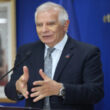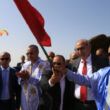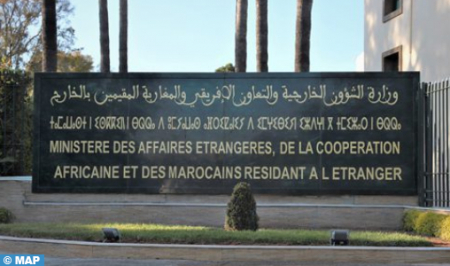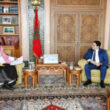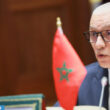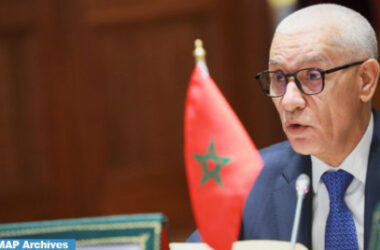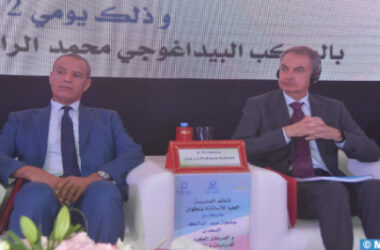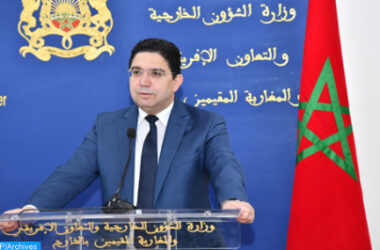Speaking at a joint press conference with the Yemeni Minister of Foreign Affairs and Expatriates, Ahmed Awad Bin Mubarak, held after their talks, Bourita expressed the Kingdom’s solidarity with sisterly Yemen in the face of Iranian interference, stressing the “strong and constant” support of His Majesty King Mohammed VI to the legitimacy in Yemen, through the Presidential Council, and to all efforts to complete the transitional stages in this country.
On the High Instructions of HM the King, the minister added, Morocco defends legitimacy in Yemen and the imperative of guaranteeing conditions of security and stability for the Yemeni people, expressing the Kingdom’s recognition of the Presidential Council as the legitimate representative and official interlocutor of the Kingdom of Morocco in all matters concerning the Republic of Yemen.
He noted, in this sense, the great interest HM the King takes in the humanitarian aspects in Yemen and the Yemeni people, recalling that the Sovereign had given His high instructions to deliver material aid to this country during the current year.
Regarding the latest developments in the Yemeni file, Bourita noted that Morocco welcomes the “wise and positive” positions expressed by the Yemeni government and the legitimate authority in Yemen on the issue of renewing the truce, welcoming the tendency of the legitimate authority and the presidential council to always put the interest of Yemen and Yemenis above all other considerations.
Unfortunately, this positive spirit has not been echoed by the other side which operates according to the “logic of blackmail”, undermining the security of Yemen and Yemenis, working for foreign agendas, threatening regional security and peace, not only in Yemen, but also in other neighboring countries, he continued.
Morocco had clearly expressed, at the highest level, its condemnation of terrorist acts committed by Houthi militias, the minister recalled, noting that these acts constitute a threat both to the safety of Yemenis and the security of the Kingdom of Saudi Arabia and the United Arab Emirates.
He, in this regard, urged the international community and the Security Council to consider these armed attacks as “terrorist acts of a group that does not take into account the security of Yemen and the interests of Yemenis, but rather acts according to agendas supported mainly by the Iranian side.
In response to a question about the ongoing events in Yemen, Bourita said that Morocco supports the integrity of Yemen and its national and territorial sovereignty, while supporting all international references, the Gulf and Yemen, subject to consensus on the matter.
“The truce, despite all violations by the Houthis, was a positive signal for the safety, tranquility and security of the Yemeni people,” he noted, stressing that Morocco, like the international community, welcomed the positive response of the Yemeni government, which prevails the principle of responsibility and the interest of the country.
On the other hand, “the Houthi position does not serve the interests of Yemen and its people, but those of Iran in the first place. It contributes to the escalation and destruction of the few gains that have been achieved during the truce,” Bourita added, noting that the Houthi position on the truce jeopardizes the security of other Arab countries.
Yemen has become a space of Iranian interference through the Houthi militias, said the minister, ensuring that other Arab countries are victims of this interference either directly or indirectly, or through the use of armed and terrorist organizations.
In this sense, the minister said that the proliferation of armed non-governmental actors is “a threat to peace and security at the regional and international levels,” noting that the countries arming these actors with sophisticated technologies must assume full responsibility before the international community, since these non-governmental actors have no legal responsibility and are not a party to demilitarization agreements or agreements on the use of weapons, unlike official governments.
Bourita said that “Iran cannot continue to exploit this loophole to undermine security and stability in the Arab region, especially in Yemen, the Middle East and North Africa,” noting, in this sense, that Morocco is also a victim of this interference.
The Arab League Committee to address Iranian interference was clear in advancing that Iran is the official sponsor of separatism and terrorism in the Arab world, with the contribution of several parties, said Bourita.
For his part, Mr. Awad Bin Mubarak expressed his country’s gratitude for “the clear and explicit position” of Morocco regarding Iranian interference in Arab affairs, ensuring that the Kingdom of Morocco was among the first countries to take a clear position against this interference.
The head of Yemeni diplomacy said that his country supports all efforts aimed at achieving a comprehensive and lasting peace based on international references and resolutions, adding that the Arab coalition is working to bring together all the conditions conducive to peace and return to the negotiating table.
“The truce that lasted six months was a hope for the Yemenis and an opportunity to discuss several issues despite the violations of the Houthi side,” which prevailed its interests and those of Iran at the expense of the Yemenis, said the minister.
“At a time when everyone was supporting the Yemeni dialogue, Iran was sending ships full of weapons to the Houthis. This is an operation recorded in international reports,” said the head of Yemeni diplomacy, adding that “every time we get closer to the solution, Iran intervenes to sabotage the negotiations.
He called on the international community to adopt clear positions and a new approach to the political scene in Yemen and the intervention of Iran in this country, stressing the need to register the Houthi militias as a terrorist group.


